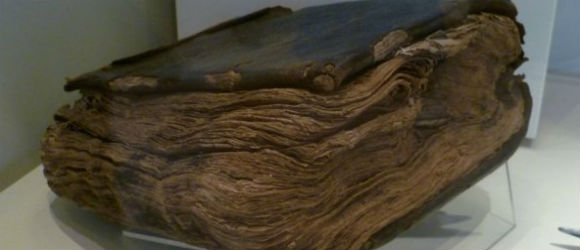Two of the four rivers in the Creation account have their source in eastern Turkey. The Euphrates and Tigris Rivers flowed through the Garden of Eden (Gen. 2:13). Some traditions suggest that this garden in which Adam and Eve lived was located in southeastern Turkey. After the great flood Noah’s ark rested on the mountains of Ararat (Gen. 8:4). Mount Ararat, near the border of Armenia and Iran, is often identified as this site. The descendants of Noah’s son Japheth comprised the nations that settled Anatolia Gomer, Magog, Javan, Tubal, and Meschech (Gen. 10:2). After Abraham left Ur of the Chaldees, he settled for a time in Haran (Gen. 11:31–32), continuing his journey to Canaan only after his father Terah died. Jacob later lived in the region of Haran (Gen. 28:10ff.) for fourteen years while completing his service to Laban for his marriages to Leah and Rachel.
One of the great nations that lived to the north of Israel was the Hittites (Josh. 1:4). This empire, whose capital was Bogazkale, or Hattusas, existed from 1800–1200 b.c. A related people lived in Palestine, and Uriah, the husband of Bathsheba, was a Hittite mercenary (2 Sam. 11:3– 24). One of the most important battles in history occurred at Carchemish. Here in 605 b.c. the Babylonian commander Nebuchadnezzar II defeated the Egyptian army, which four years earlier had killed Judah’s last righteous king Josiah at Megiddo (2 Chron. 35:20–23). With the defeat of the Assyrians and their allies the Egyptians, the Babylonians now controlled the Near East. Two decades later Jerusalem was destroyed and the Jews sent into exile (586 b.c.). The earliest references to Jewish exiles in Turkey is found in Obadiah 20. Here Sepharad is a likely reference to Sardis.
Sites in Turkey in the Old Testament and Apocrypha
| Aram-naharaim | Gen 24:10 |
| Ararat (Urartu) | Gen 8:4; 2 Kgs 19:37; Isa 37:38; Jer 51:27 |
| Caphtor (Cappadocia?) | Deut 2:23; Amos 9:7 (LXX); Jer 47:4 (Vulgate, Syriac) |
| Carchemish | 2 Chr 35:20; Isa 10:9; Jer 46:2 |
| Caria | 1 Mac 15:23 |
| Cilicia | 1 Mac 11:14; 2 Mac 4:36; 4 Mac 4:2; Judith 1:7, 12; 2:21, 25 |
| Cnidus | 1 Mac 15:23 |
| Daphne | 2 Mac 4:33, 38 |
| Euphrates | Gen 2:14; 2 Chr 35:12 |
| Halicarnassus | 1 Mac 15:23 |
| Haran | Gen 11:31–32; 12:4–5; 27:43; 28:10; 29:4; 2 Kgs 19:12; Isa 37:12; Ezek 27:23; |
| Helech | Ezek 27:11 |
| Kue (Cilicia) | 1 Kgs 10:28; 2 Chr 1:16 |
| Lud | Isa 66:19; Ezek 27:10? |
| Lycia | 1 Mac 15:23 |
| Magnesia on the Meander (“coastlands”) | Dan 11:18 (implied battle) |
| Magog | Ezek 38:2 |
| Meshech | Ps 120:5; Ezek 27:13; 32:26; 38:2, 3; 39:1 |
| Minni | Jer 51:27 |
| Muzur | Deut 17:16; 1 Kgs 10:28, 29; 2 Kgs 7:6; 2 Chron 1:16; 9:28 (NIV, NLT fn; NJB), Musru (NJPS fn), Musri (CEV) |
| Myndos | 1 Mac 15:23 |
| Nahor | Gen 24:10 |
| Paddan-aram | Gen 25:20; 28:2–7; 31:18; 33:18; 35;9; 35:26; 46:15 |
| Pamphylia | 1 Mac 15:23 |
| Phaselis | 1 Mac 15:23 |
| Side | 1 Mac 15:23 |
| Sepharad (Sardis) | Obadiah 20 |
| Syria | Judith 1:12; 1 Es 2:25; 6:3, 7, 27; 8:19, 23; 4 Es 16:1; 1 Mac 3:41; 11:2, 60; 4 Mac 4:2 |
| Tarshish (Tarsus?) | Isa 66:19; Jon 1:3; 4:2 |
| Tigris | Gen 2:14 |
| Togarmah (Gürün) | Gen 10:3; 1 Chron 1:6; Ezek 27:14, 38:6 |
| Tubal | Isa 66:19: Ezek 27:13; 32:26; 38:2, 3; 39:1 |

